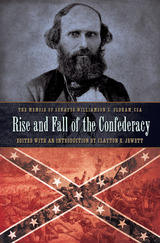2 books by Jewett, Clayton E.

Rise and Fall of the Confederacy
The Memoir of Senator Williamson S. Oldham, CSA
Edited & Intro by Clayton E. Jewett
University of Missouri Press, 2006
Williamson S. Oldham was a shrewd and candid observer of the Civil War scene. Representing the always contrary and suspicious Texans in the Confederate Senate, he was a major opponent of President Jefferson Davis and spoke out vehemently against conscription—which he considered an abusive violation of individual rights—and against military interference in the cotton trade.
Oldham’s memoir provides a firsthand look at the Civil War from the perspective of a government insider. In it, he sheds light on such topics as military strategy, foreign relations, taxes, and conflicts between state officials and the Confederate government. Perhaps more important, his travels between Texas and Richmond—both during and after the war—allowed him to observe the many changes taking place in the South, and he made note of both the general sentiment of citizens and the effect of political and military measures on the country.
Throughout the memoir, Oldham consistently stresses the centrality of politics to a society and the necessity of legislating for the will of the people even in times of war. In assessing the Confederacy’s defeat, he points not to military causes but to Congress’s giving in to the will of the president and military leaders rather than ruling for and representing the people.
Clayton E. Jewett has edited and annotated Oldham’s memoir to produce the only fully edited publication of this important document, significantly expanded here over any version previously published. His introduction helps clarify Oldham’s position on many of the topics he discusses, making the memoir accessible to scholar and Civil War buff alike, while his annotations reflect his deep knowledge of the intrigue of wartime political life in both Texas and Richmond.
Oldham’s memoir offers important new insight into not only political leadership and conflicts in a young nation but also the question of why the South lost the Civil War, dispelling many myths about the defeat and bolstering interpretations of the Confederacy’s decline that point more to political than to military causes. Rise and Fall of the Confederacy is one of the major political and social documents of the Confederacy and will be a boon to all scholars of the Civil War era.
[more]

Texas in the Confederacy
An Experiment in Nation Building
Clayton E. Jewett
University of Missouri Press, 2002
Historians examining the Confederacy have often assumed the existence of a monolithic South unified behind the politics and culture of slavery. In addition, they have argued for the emergence of a strong central state government in the Confederacy. In Texas in the Confederacy, Clayton E. Jewett challenges these assumptions by examining Texas politics, with an emphasis on the virtually neglected topic of the Texas legislature. In doing so, Jewett shows that an examination of state legislative activity during this period is essential to understanding Texas’s relationship with the Indian tribes, the states in the Trans-Mississippi Department, and the Confederate government.
Jewett explores the role of leadership and how statesmen understood and handled the apparent contradictions between the national interests of war and the need to protect property and individual liberty. He reveals that the dissemination of political power lay in the state legislature, where politicians united in an effort to protect commercial interests beyond the institution of slavery. This course of action resulted not only from Texas’s development of an identity separate from that of other southern states, but also from Confederate neglect of Texas. This in turn served to undermine the formation of central state authority and directly contributed to the defeat of a southern nation and the war effort.
By advancing the historiographical line of inquiry surrounding the critical issues of secession, military enlistment, cotton trading, economic production, and legislative support for state institutions, Texas in the Confederacy addresses the perennial question of why the South lost the Civil War. It also provides an essential step in changing the direction of inquiry toward a deeper understanding of nationhood and how the South functioned during the Civil War.
[more]
READERS
Browse our collection.
PUBLISHERS
See BiblioVault's publisher services.
STUDENT SERVICES
Files for college accessibility offices.
UChicago Accessibility Resources
home | accessibility | search | about | contact us
BiblioVault ® 2001 - 2024
The University of Chicago Press









